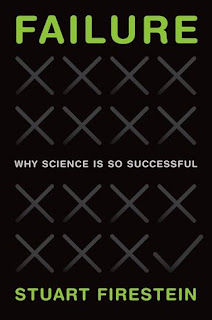A Role Model in Failure
It is painful to admit, but important to do so. I apologize to all. I was a bit busy when this was submitted, and did not do my job well. https://t.co/gJDU0pzlN8
My motto, shared for 29 years with my three children: "I'm not perfect, but I'm good enough." Works for me. Seems to work for a lot of us. https://t.co/MOKyxHkira— Frances Arnold (@francesarnold) January 8, 2020
— Frances Arnold (@francesarnold) January 2, 2020
Yes that Frances Arnold, 2018 Chemistry Nobel Laureate Frances Arnold. This is a reminder of the volatility of scientific epistemology, regardless the source. This does not mean that we cannot make meaningful predictions and statements about the world, but it does mean that no theory or scientist should be so dear we cannot imagine it or they being wrong. In the words of Stuart Firestein author of Failure: Why Science is So Successful (public library):
"Science is a series of provisional findings that iteratively moves us closer and
closer to a truth that may never be fully attained. But the provisional iterations are
valuable even though they are ultimately wrong."
More beautiful is the humility, grace, and integrity seen in Arnold's openness in admitting her mistake. The choice to purse a life as a research scientist is a choice to guarantee failure and being wrong, and often publicly so. This is not something to fear, abhor, or fabricate one's way out of. But rather we should embrace it because:
"Finding problems – good problems, relevant problems, important problems –
that’s what a good scientist does. And where do these problems come from? Our
failures, of course. Failures are the most reliable source of new and better
problems. Why better? Because they have been refined by failure. We know a bit
more about what we don’t know. And with this new distilled ignorance we can see
more clearly what the crucial question is."
I highly recommend Firestein's book to further explore this topic, and as a little bit of hope during those times when research seems an uphill battle. And with this being the week our research proposals are due I found this topic all the more fitting. We plan so diligently with so many expectations and pressures, may we not fear failure knowing it is an essential part of our future success.



Comments
Post a Comment